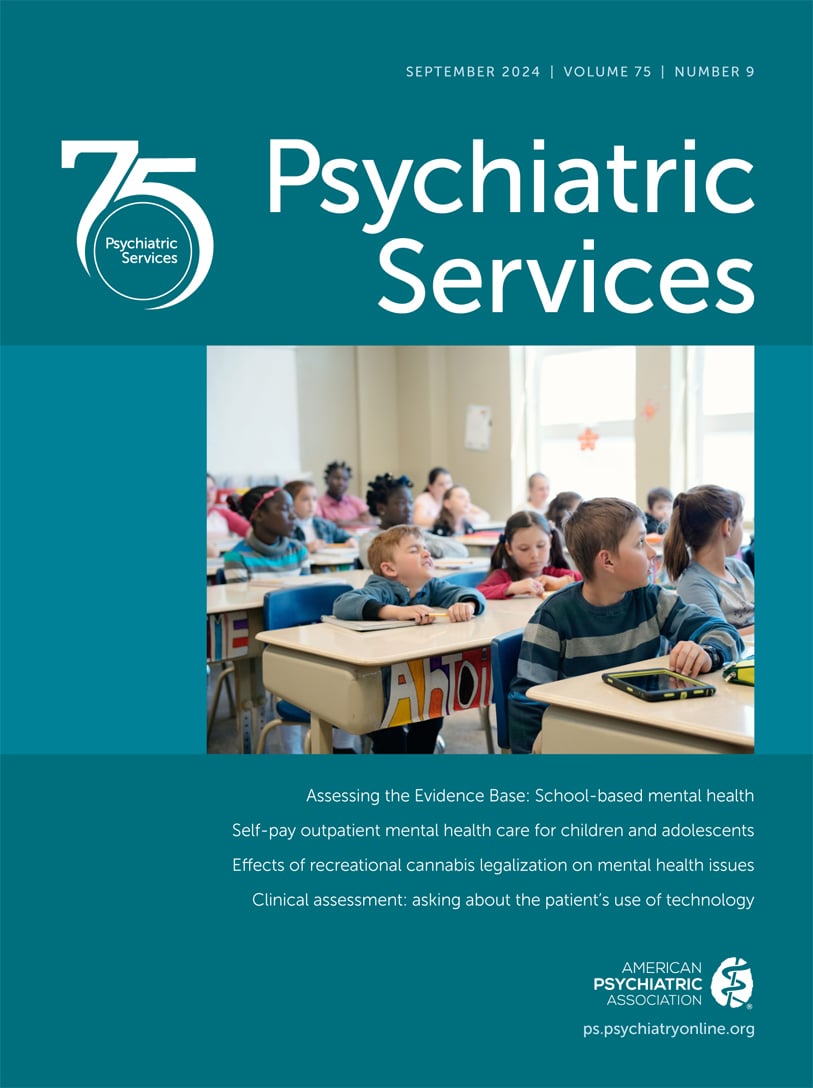Psychiatric Services
- Volume 65
- Number 1
- January 2014
Book Reviews
Taking Issue
This Month's Highlights
Columns
Publication date: 01 January 2014
Pages5–7A 2012 California law banning treatment to change the sexual orientation of patients under 18 years old marked the first time a state has restricted the practice of a specific psychotherapy. Practitioners of the therapy sued, arguing that the ban violated ...
https://doi.org/10.1176/appi.ps.650102Publication date: 01 January 2014
Pages8–10More than 100,000 offenders in the Texas correctional system have a mental illness, which represents about 19% of the state’s correctional population, including offenders in prison and under community correctional supervision. To reduce these numbers, a ...
https://doi.org/10.1176/appi.ps.201300411Assessing the Evidence Base Series
Publication date: 01 January 2014
Pages11–15With this issue, Psychiatric Services launches a 14-article series evaluating the latest evidence for commonly used, recovery-focused services. As this introduction makes clear, the goal of the series, which was commissioned by the Substance Abuse and ...
https://doi.org/10.1176/appi.ps.201300214Publication date: 01 January 2014
Pages16–23After 20 years of research, evidence of the effectiveness of supported employment for individuals with mental disorders is irrefutable. Across the country, this approach has replaced sheltered workshops for people who want the benefits and satisfaction of ...
https://doi.org/10.1176/appi.ps.201300262Articles
Publication date: 01 January 2014
Pages24–32As e–mental health applications proliferate, the Internet is increasingly viewed as a potentially transformative tool that will broaden access to effective mental health services. This “rapid review” of the literature found an encouraging amount of ...
https://doi.org/10.1176/appi.ps.201300009Publication date: 01 January 2014
Pages33–49Online therapies, Web-based self-management systems, and Internet forums are rapidly becoming part of the mental health services repertoire, but can they be effective for individuals with psychotic disorders? This literature review indicates that people ...
https://doi.org/10.1176/appi.ps.201300050Publication date: 01 January 2014
Pages50–58Policies to restrict access to firearms among persons with serious mental illness are popular, but are they supported by evidence? As this literature review demonstrates, some things are clear: most persons with serious mental illness are not violent; ...
https://doi.org/10.1176/appi.ps.201300141Publication date: 01 January 2014
Pages59–67Objective The purpose of this study was to examine racial-ethnic differences in use of mental health treatment for a comprehensive range of specific disorders over time. Methods Data from the National Ambulatory Medical Care Survey and the National Hospital ...
https://doi.org/10.1176/appi.ps.201200528Publication date: 01 January 2014
Pages68–74Objective This study examined the factors associated with service utilization for mental health conditions among Latino and Asian non-U.S. citizens in the United States by service type and race. Methods Data were obtained from the National Latino and Asian ...
https://doi.org/10.1176/appi.ps.201200430Publication date: 01 January 2014
Pages75–80Objective Guidelines strongly recommend that smokers with mental illness receive evidence-based smoking cessation interventions similar to those provided to smokers in the general population. The goal of this study was to evaluate the resources, barriers, ...
https://doi.org/10.1176/appi.ps.201200247Publication date: 01 January 2014
Pages81–90Objective The authors compared fidelity to bipolar disorder treatment at community practices that received a standard or enhanced version of a novel implementation intervention called Replicating Effective Programs (REP). Methods Five community practices in ...
https://doi.org/10.1176/appi.ps.201300039Publication date: 01 January 2014
Pages91–97Objective This study used a questionnaire to identify individuals who met criteria for posttraumatic stress disorder (PTSD) ten months after surviving a disaster and compared their use of health care services before and after the disaster with that of ...
https://doi.org/10.1176/appi.ps.201200535Publication date: 01 January 2014
Pages98–105Objective This study assessed the prevalence of general medical problems, stress or emotional problems, and alcohol problems reported by members of the armed forces of the United Kingdom after deployment in Iraq or Afghanistan. The study also identified ...
https://doi.org/10.1176/appi.ps.004972012Publication date: 01 January 2014
Pages106–112Objective Large-scale health care systems such as the Veterans Health Administration (VHA) have recently invested heavily in the expansion of psychotherapy services. This study examined longitudinal changes in use of psychotherapy at the VHA during a ...
https://doi.org/10.1176/appi.ps.201300056Open Forum
Publication date: 01 January 2014
Pages113–115Working as a mental health professional in the Veterans Affairs (VA) health care system can be very rewarding. Providers have the privilege of caring for America’s heroes, many opportunities to learn and implement evidence-based practices, and the ability ...
https://doi.org/10.1176/appi.ps.201300109Brief Reports
Publication date: 01 January 2014
Pages116–120Objective The Recovery-Oriented Decisions for Relatives’ Support (REORDER) intervention is an innovative, manualized protocol utilizing shared decision-making principles with persons who have serious mental illnesses to promote recovery and encourage ...
https://doi.org/10.1176/appi.ps.201300074Publication date: 01 January 2014
Pages121–124Objective This study examined state and demographic variation in use of depot antipsychotics among Medicaid beneficiaries with schizophrenia. Method Medicaid claims data (2007) from 21 states and the District of Columbia were analyzed for 102,884 ...
https://doi.org/10.1176/appi.ps.201300001Publication date: 01 January 2014
Pages125–128Objective Psychotropic polypharmacy in the treatment of bipolar disorder has proliferated. Yet evidence about the prevalence and predictors of different combinations of polypharmacy in inpatient settings is scarce. Methods The Nationwide Psychiatric ...
https://doi.org/10.1176/appi.ps.201200529Frontline Reports
News and Notes
Past Issues
View Issues Archive
Vol. 75 | No. 12

Vol. 75 | No. 11

Vol. 75 | No. 10
